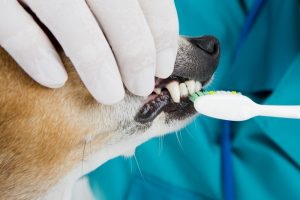 Dental care for our pets is an often overlooked area of their lives. Dental disease is widespread in our animals with approximately 70% of cats and 80% of dogs showing some signs of dental disease by the age of 2! It starts with plaque and tarter, which can lead to gingivitis, tooth decay and the build-up of bacteria in the mouth. The bacteria can spread, causing infections in other organs of the body, including the heart. Small dogs and certain breeds are more prone to dental disease than others. Even if your pet isn’t showing signs of dental disease, ask us for advice on how to clean your pet’s teeth to prevent problems in the future. It can be as easy as regular brushing or switching to a food designed for oral health.
Dental care for our pets is an often overlooked area of their lives. Dental disease is widespread in our animals with approximately 70% of cats and 80% of dogs showing some signs of dental disease by the age of 2! It starts with plaque and tarter, which can lead to gingivitis, tooth decay and the build-up of bacteria in the mouth. The bacteria can spread, causing infections in other organs of the body, including the heart. Small dogs and certain breeds are more prone to dental disease than others. Even if your pet isn’t showing signs of dental disease, ask us for advice on how to clean your pet’s teeth to prevent problems in the future. It can be as easy as regular brushing or switching to a food designed for oral health.
Once tarter builds up on the teeth, at home care is not enough to manage it. Dental cleanings done at the clinic are needed to remove that tarter and regain a healthy mouth. Cleanings on our animals are very similar to what your dentist would do. Our technicians use an ultrasonic scaler to remove plaque and tarter from the teeth. The teeth are then polished and a fluoride treatment is applied. The main difference is that our animals must be under anesthesia during the procedure. The anesthetic we use for our cleanings is a very short acting injectable, followed by a gas anesthetic to maintain them throughout the cleaning. During the procedure, a doctor is monitoring the anesthetic, examining the teeth and performing any extractions that are needed.
We work very hard to make this procedure as stress-free as possible for both our owners and their pets. As with all our anesthetized animals, we recommend additional procedures such as pre-anesthetic blood work, IV fluids during the procedure and ECG monitoring (these are discussed in more detail under Surgery). Your pet will need to come in first thing in the morning and will be ready to go home by early afternoon.
If you have any questions about our services, please contact us today at (859) 887-8086.
